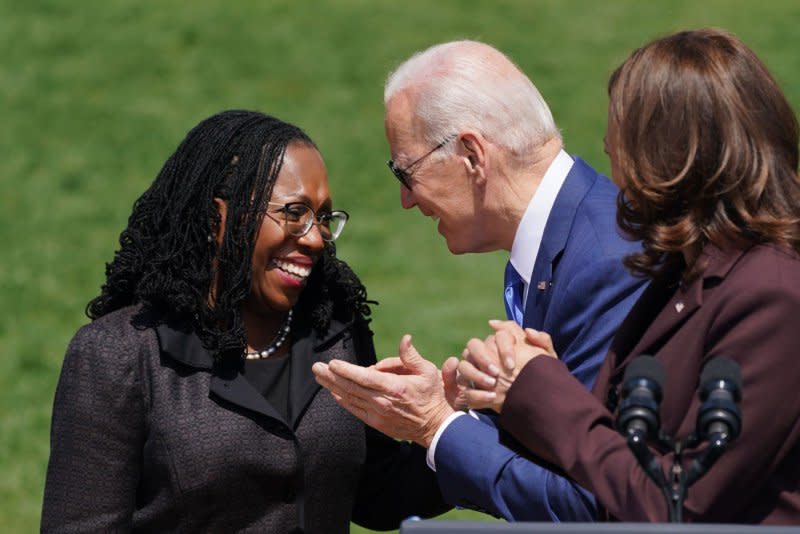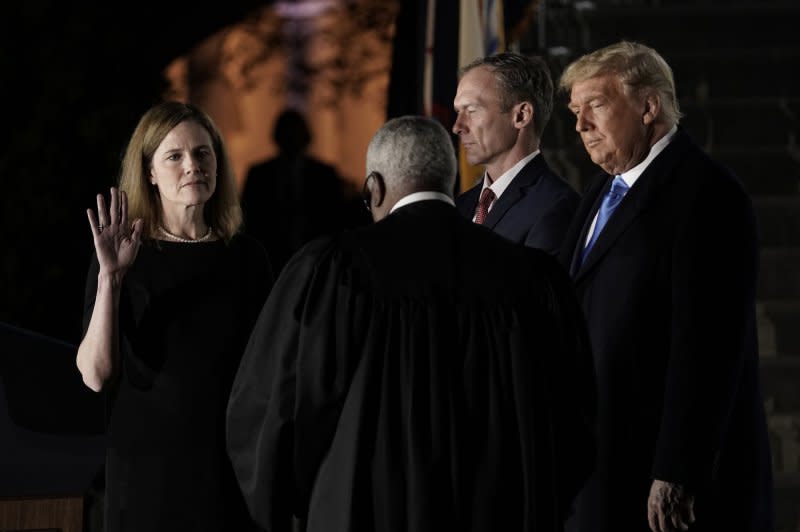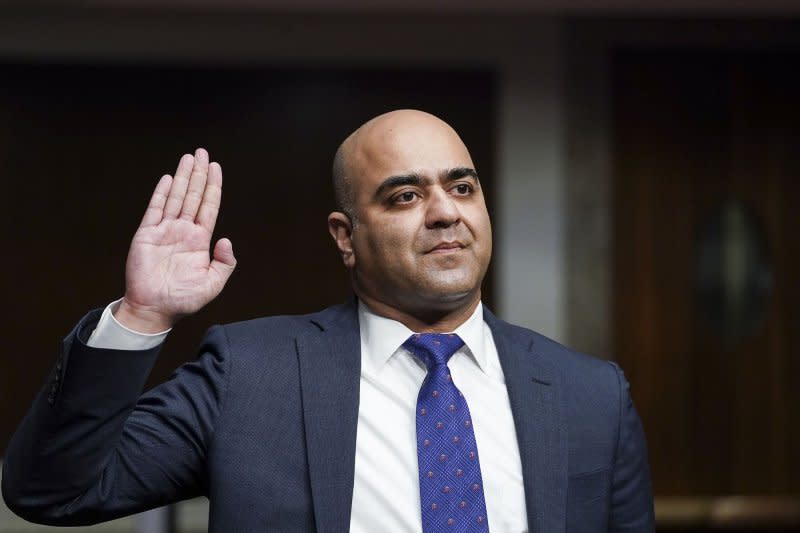Biden's judicial appointments most diverse in U.S. history; Trump's still loom large

May 28 (UPI) -- The Senate last month confirmed President Joe Biden's 200th judge, with months left in his term to catch or surpass his predecessor Donald Trump's 264 nominations.
Biden's 201 appointments are the most diverse groups of judges appointed by a president in U.S. history. But Trump's three Supreme Court appointments have helped reshape the court system, Howard Schweber, professor emeritus of political science at the University of Wisconsin, Madison, told UPI.
"These appointments don't do anything to change the most controversial and public of decisions by Trump's appointments," Schweber said. "Roe vs. Wade, the gun rulings, those big constitutional shifts. The decline in judicial respect for individual agencies, the new approach to religious freedoms. All those things ultimately take place at the level of the U.S. Supreme Court."
Biden has accomplished one of his major campaign promises, however. He has appointed the most diverse group of judges in U.S. history.
An overwhelming majority of Biden's judicial appointments are women or racial minorities. Two-thirds are women. He also appointed Ketanji Brown Jackson, the first Black woman to sit on the Supreme Court and Zahid Quraishi, the first Muslim federal judge.

During Biden's first term in office, fewer than 15% of his appointments have been White men.
By contrast, 84% of Trump's appointments were White and 76% were men, according to the Pew Research Center.

"Obviously, there's a pretty commonsensical idea that when people go into a courtroom they want to see somebody judging them that looks like them," Russell Wheeler, non-resident senior fellow at the Brookings Institution, told UPI. "It's a far cry from 50 years ago when every judge was a White male."
How Biden's judges stack up
The American Bar Association's ratings for judicial nominees have long been an influential marker of how suitable those candidates were for the bench. This influence has shifted as judicial appointments have become more influenced by partisan organizations.
The Republican and Democratic parties and the presidents from those parties have increased their emphasis on picking judges that align with their policy goals, Paul Helmke, professor of practice at Indiana University, told UPI.
The Federalist Society, a conservative and libertarian policy advocacy organization, has gained more influence over nominations from Republican lawmakers. The same is true for the American Constitution Society and Alliance for Justice for Democratic lawmakers.
However, the ABA's ratings are still highly regarded among experts in law and policy, even as senators favor measurements by their respective organizations.
"I still think it's important. They did a good job in past years," Helmke said. "The ABA is presumably a neutral group."
Of Biden's 217 nominations, the ABA rated 186 "well qualified," 28 "qualified" and three received "qualified/not qualified" ratings.
During the 117th session of Congress, three of Biden's nominations received "not qualified" votes but a majority of votes deemed those nominees qualified. Four received "not qualified" votes during the 118th congressional session but again the majority rated them qualified.
Trump nominated 264 judges and 196 were appointed. Of his nominations, 10 were deemed "not qualified," with four votes being unanimous. There were 187 judges rated "well qualified" and 67 rated "qualified."
Partisanship's role in confirmations
Judicial appointments used to be far less controversial, Helmke said.
"Generally the feeling from the Senate was that the president should be able to nominate people he thought would be good judges," Helmke said. "The Senate would often sign off on them. The ABA would weigh in saying this person has a good reputation, they're competent and they're qualified. That used to be the only real focus."
The focus has changed as the Republican and Democratic parties have become more polarized, especially in Congress. Votes for and against confirming judges have veered toward party-line votes.
Republicans, or more often conservative special interest groups, seemed to catch on to the advantage ideologically aligned judges can create for their causes, according to Helmke.
"With Congress doing less and less, the courts are doing more and more," he said. "Republicans figured this out before Democrats did."
Logjams in Congress have caused presidents to turn toward executive orders more often. These actions are more likely to be met with lawsuits, putting them in front of the courts.
About one-third of appeals court judges were appointed by Trump. Biden has appointed slightly fewer, 51-42.
Wheeler said the 5th Circuit Court -- serving Louisiana, Texas and Mississippi -- demonstrates the influence federal judges can have on national policy. The fifth circuit is "dominated by Trump appointees," he said.
The 5th Circuit has found itself at the center of the abortion issue, ruling to limit access to the abortion medication mifepristone.
"It makes a difference in aggregate," Wheeler said. "Take any cohort of Democratic appointees. They're still more liberal than Republican appointees."
Supreme Court appointments
Every president since Ronald Reagan has appointed at least one Supreme Court Justice. Wheeler, Schweber and Helmke are doubtful another justice will be appointed during the next presidential term.
"Just look at the ages. Comparatively speaking, this group of Supreme Court justices is fairly young," Wheeler said. "You never know. It's not as if when they leave it's entirely their choice."
Helmke similarly considers age as he reasons why he does not believe a new justice is likely in the next term. Justice Clarence Thomas is the oldest justice at 75 years old. Justice Samuel Alito is 74 years old.
A judge resigning may also be a strategic decision, Helmke adds. One of the elder justices could step down to make room for a younger judge if their preferred presidential candidate is elected. He recalls the death of Justice Antonin Scalia in 2016, as a turning point in the confirmation process.
Then-Senate Majority Leader Mitch McConnell, R-Ky., led the historic and controversial move to block President Barack Obama from appointing Merrick Garland to the high court. The reasoning by McConnell was that it was too close to the election and the next president should select the justice to replace Scalia, who died about nine months before election day.
Four years later, a month before the 2020 election, the Senate confirmed Trump's appointment of Amy Coney Barrett after the death of Justice Ruth Bader Ginsburg.
"It was always sort of happenstance when somebody died or had serious health issues," Helmke said. "Once the Senate started playing games with timing, holding up nominations, rushing a nomination through, the gamesmanship has gone to a higher level."
Schweber said the happenstance around Supreme Court appointments is among the reasons he is in support of term limits.
"The fact that you have these improbable outcomes calls the whole process into question," he said. "Frankly, I think it will be a considerable period of time before there is an ideological change in the Supreme Court."


